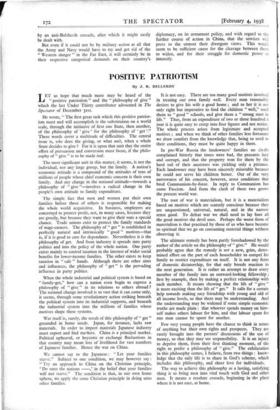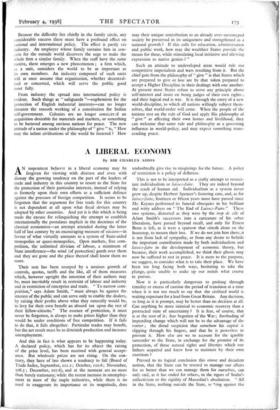POSITIVE PATRIOTISM
By J. R. BELLERBY
IJET us hope that much more may be heard of the "positive patriotism" and the "philosophy of give" which the last Under Thirty contributor advocated in The Spectator of December 31st.
He wrote, "The first great task which this positive patriot- ism must and will accomplish is the substitution on a world scale, through the initiative of first one State, then another, of the philosophy of ' give ' for the philosophy of 'get '." These words cover a multitude of difficulties. The central issue is, who does the giving, or what unit, when a whole State decides to give ? For it is upon that unit that the entire effort of persuasion and conversion must focus, if the philo- sophy of" give" is to be made real.
The most significant unit in this matter, it seems, is not the individual, nor any large group, but the family. A nation's economic attitude is a compound of the attitudes of tens of millions of people whose chief economic concern is their own family And any change in the national attitude—towards a philosophy of " give "—involves a radical change in the people's own attitude to family expenditure.
The simple fact that men and women put their own families before those of others is responsible for making the whole world acquisitive. In business, employers are concerned to protect profit, not, in many cases, because they are greedy, but because they want to give their sons a special chance. Trade unions exist to protect the family standards of wage-earners. The philosophy of" get" is established in perfectly natural and intrinsically " good " motives—that is, if it is good to care for dependants. Nevertheless it is the philosophy of get. And from industry it spreads into party politics and into, the policy of the whole nation. One party exists mainly to control taxation in the interest of wider social benefits for lower-income families. The other exists to keep taxation in " safe " hands. Although there are other aims and influences, the philosophy of " get " is the pervading influence in party politics.
When the whole industrial and political system is based on "family-get," how can a nation even begin to express a philosophy of " give " in its relations to others abroad ? The national change involved is so vast that it can come only, it seems, through some revolutionary action striking beneath the political system into its industrial supports, and beneath the industrial system into the millions of families whose motives shape these systems.
War itself is, surely, the result of this philosophy of" get" grounded in home needs. japan, for instance, lacks raw materials. In order to import materials Japanese industry must export and find markets. China is a principal market. Political upheaval, or boycotts or exchange fluctuations in that country may mean loss of livelihood for vast numbers of Japanese' families. Hence the war on China.
We cannot say to the Japanese : "Let your families starve." Subject to one condition, we may however say : "Try an approach to China on the Christian principle, 'Do unto the nations —,' in the belief that your families will not starve." The condition is that, in our own home sphere, we apply the same Christian principle in doing unto other families. It is not easy. There are too many good motives involved in treating our own family well. Every man reasonably desires to give his wife a good home ; and to her it is not only right but imperative to feed the children "well," send them to " good " schools, and give them a "strong start in life." Thus, from an expenditure of two or three hundred a year it is quite easy to creep into four figures and not notice. The whole process arises from legitimate and accepted motives ; and when we think of other families less fortunate we draw comfort from the knowledge that, being so used to their conditions, they must be quite happy in them.
In pre-War Russia the landowners' families no coibr complained bitterly that times were bad, the peasants lazy and corrupt, and that the property won for them by the hard toil of their ancestors was yielding only a pittance. Each landowner may have been sincerely miserable because he could not serve his children better. Out of the very narrowness of his concern, however, arose conditions that bred Communism-by-force. In reply to Communism has come Fascism. And from the clash of these two grows the present world war.
The root of war is materialism, but it is a materialism based on motives which are scarcely conscious because they are unquestioned, universal, natural, and in the narrow sense good. To defeat war we shall need to lay bare all the good motives the devil uses. Perhaps the worst form of materialism is that practised by those of us who have become so spiritual that we go on consuming material things without observing it.
The ultimate remedy has been partly foreshadowed by the author of the article on the philosophy of" give." He would probably agree that the remedy is not a new, grim, deter- mined effort on the part of each householder to compel his family to restrict expenditure on itself. It is not any form of domestic dictatorship, for that only breeds reaction in the next generation. It is rather an attempt to draw every member of the family into an outward-looking fellowship ; first by example, then by making a perfect relationship with each member. It means showing that the life of " give " is more exciting than the life of" get." It calls for a certain help towards making easy friendship with young and old of all income levels, so that there may be understanding. And the understanding may be widened if some simple economic truths are made plain : that whoever spends money on him- self makes others labour for him, and that labour spent for one man cannot be spent for another.
Few very young people have the chance to think in terms of anything but their own rights and prospects. They are rarely brought into the parents' discussions of the use of money, so that they may see responsibility. It is an injury to deprive them, from their first thinking moment, of the right to prefer a philosophy of "give." The exhilaration in this philosophy comes, I believe, from two things : know- ledge that the only life is to share in God's scheme, which includes this philosophy, and sheer love for individuals.
The way to achieve this philosophy as a lasting, satisfying thing is to bring men into vital touch with God and other men. It means a resolute crusade, beginning in the place where it is not easy, at home. Because the difficulty lies chiefly in the family circle, any considerable success there must have a profound effect on national and international policy. The effect is partly via industry. An employer whose family sustains him in con- .:ern for the outside world discovers the urge to make the whole firm a similar family. When the staff have the same motive, there emerges a new phenomenon ; a firm which, as a unit, considers the world to be as important as its own members. An industry composed of such units will at once assume that organisation, whether decentral- ised or concerted, which will serve the public good . most fully.
From industry the spread into international policy is evident. Such things as "safeguards "—euphemism for the protection of English industrial interests—can no longer threaten the smooth working of a constitution for Indian self-government. Colonies are no longer consider zd an acquisition desirable for materials and markets, or something to be bartered among envious nations for peace. The new attitude of a nation under the philosophy of" give " is, " How may the infant civilisations of the world be fostered ? How may their unique contribution to an already over-stereotyped society be preserved in its uniqueness and strengthened as a national growth ? If this calls for education, administration and public work, how may the wealthier States provide the means for these, while stimulating local initiative and allowing expression to native genius ? "
Such an attitude to undeveloped areas would rule out competitive imperialism and wars resulting from it. But the chief gain from the philosophy of" give " is that States which are prepared to give or lose are by that token prepared to accept a Higher Discipline in their dealings with one another. At present most States refuse to serve any principle above self-interest and insist on being judges of their own rights ; and their logical end is war. It is through the entry of a new world-discipline, to which all nations willingly subject them- selves, that world-order will come. When the people of the nations rest on the rule of God and apply His philosophy of " give " as affecting their own homes and livelihood, they can welcome that same rule and philosophy as a governing influence in world-policy, and may expect something trans- cending peace.















































 Previous page
Previous page